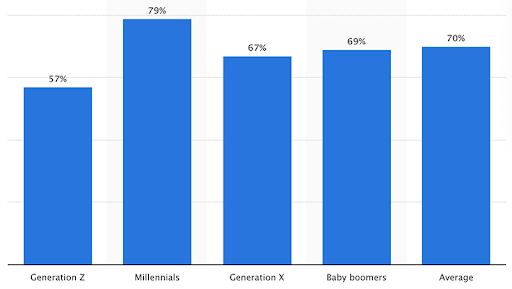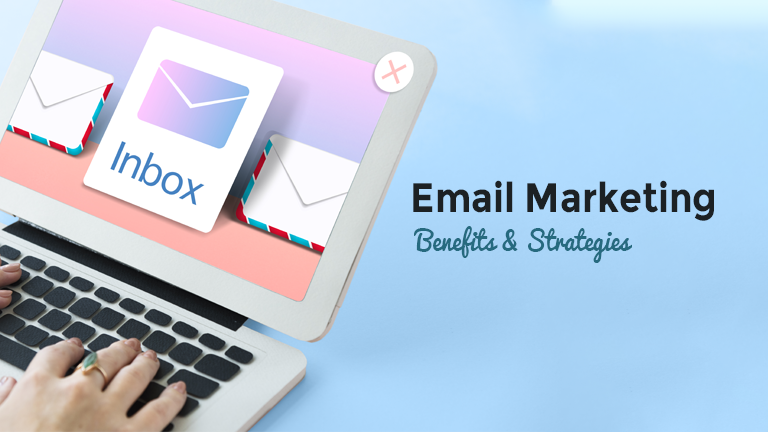Email is the most effective way for a business to communicate with consumers. According to Hubspot, 86% of customers prefer to receive promotional emails at least once a month from companies they do business with, and 15% prefer daily emails. Email is the most convenient way to promote sales, deliver company news or remarket to past customers. According to a recent study, email marketing is popular across generations and allows businesses to successfully and affordably reach large audiences.

What is email marketing?
Email marketing is the process of communicating or sending messages to a group of people via email. Email can be used to build relationships with potential customers, promote a product or service, build brand awareness, etc. More than 70% of millennial consumers trust businesses that communicate via email, and more than 40% of marketers still choose email marketing as a highly effective marketing method.
Email marketing prioritizes communication and awareness with current customers and clients. Emails can be used to persuade and attract new customers. The best email marketing plan takes into account the purpose, goals, and delivery method. Campaigns aimed at acquiring new customers, engaging existing customers, or converting referrals into sales all have their own goals and techniques.
Before you can understand the benefits of email marketing, you must first understand the different types of emails a business can send.
These include –
Welcome emails – which engage users when they first interact with your brand
Special offer emails – which inform users about special offers in the market
Educational emails – which are any type of email that informs or educates readers about a specific issue or an event
Re-engagement emails – These are emails where you engage with users who don’t normally interact with your brand’s emails that they receive after a specific action, such as a purchase. interest Done right, a newsletter is a cost-effective, quick and easy way to keep customers informed (and excited) about new product launches or new promotions.
Cart Abandonment Emails – When users abandon their cart, a type of reminder is sent
Confirmation Emails – These are the emails one receives after completing a certain action such as making a purchase
The Benefits of Email Marketing
- Increase customer engagement:
Email marketing is very effective in generating customer interest. When done right, a newsletter is a cost-effective, fast, and simple way to keep customers informed on (and excited about) new product launches or new promotions.
- Personalization and Targeted Content:
Email marketing involves segmenting your target audience based on their likes and dislikes to share personalized content with them. It makes them feel valued and important with personalized subject content such as subject lines.
- Increase Customer Loyalty:
Email marketing allows you to regularly communicate with customers and website visitors. Verified Buyers also appreciate being up to date on the latest products and offers. Research shows that acquiring a new customer costs five times more than keeping an existing one.
- Better Customer Reach:
Email marketing has a better chance of being seen compared to social media updates where they may miss notifications and simply scroll up their news feeds. Emails can be sent to thousands of users with just a few clicks. These users are free to read as they wish – online or offline.
- Reach people on multiple devices:
The big advantage of email marketing is that you can reach people on different devices – smartphones, desktops, and tablets. Over 60% of millennials check their email on their phone three times a day. This is a booming market for all marketers!
- Easy to maintain and affordable:
As mentioned earlier, email marketing is cost-effective and relatively easier, and cheaper to maintain. Email marketing services like MailChimp or ActiveCampaign have simplified the process, allowing for greater automation and customization.
- Faster Results:
Like any other marketing campaign, email marketing is trackable and has the potential to be hit or miss. But with email marketing, a business needs to get faster results for two reasons. You target an audience that is already interested in your brand so that they act faster to become a customer. This is one of the most powerful benefits of email marketing.
Second, with email, the viewer receives notifications due to personalized targeting compared to social media where you have to scroll through Instagram to receive an ad.
Email Marketing Strategies
Although email marketing is easy to set up and manage, establishing a goal-oriented plan will get results.
- Define KPIs:
Define your KPIs. What is the click-through rate, or the percentage of email recipients who actually click on the link in it? Or the conversion rate, the percentage of recipients who made a purchase or completed a form requesting more information? What is your opening rate? Even unsubscribing and listing growth rates can give you an idea of how effective your emails are.
- Audience segmentation:
Different subscribers and consumers require strategies that meet their specific requirements. At a minimum, segment your email marketing by the recipient. Different messages and touches are needed for potential consumers, new customers, and loyal customers. In addition to segmentation, message personalization increases relevance and encourages email opens and brand engagement.
- Use your CRM:
Segmentation, personalization, and measurement are more accessible with an integrated CRM that can manage contact information, distribution lists, and campaigns. Use an e-marketing engine to automate your operations if you already have a marketing automation system or even a CRM with automation features.
Emails can provide a variety of business opportunities, from generating leads to engaging customers, regardless of company size and industry. Of course, depending on your needs, your infrastructure, and the capabilities of your organization, email marketing is customizable and scalable enough to meet complex marketing goals. Often at the beginning of marketing, email marketing allows organizations to begin acquiring their skills as technological and organizational maturity progresses.
 Finland
Finland Bangladesh
Bangladesh
